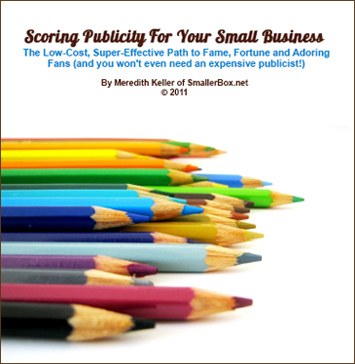When people think about getting press for their business, print magazines often come to mind. Wouldn’t it be great to be featured in Real Simple or Marie Claire? Those placements certainly have value, but print placements have a couple of disadvantages:
1. Lack of Traceability
How do you know that spending hours pursuing those print placements is paying off? If you’re lucky, the magazines will print your URL with their mention of your product, but that means customers will just go directly to your URL to buy. You won’t be able to tie that site traffic or those sales back to your placement in a magazine.
2. Lack of Immediacy
When a shopper sees your business mentioned on her favorite blog, she can just click to go to your website. She’s already online and doesn’t have to try to remember a URL. A magazine reader has to remember a URL and remember to visit it next time she’s near a computer. That’s a lot of remembering.
While getting your brand featured in print has a certain cachè, there’s a lot to be said for online placements. In addition to the ability to track the results of an online placement using a tool like Google Analytics and the convenience of prospective customers being able to just click and go, online placements provide tremendous search engine optimization (SEO) benefits.
SEO is comprised of two major components: on-page SEO, which involves setting up your site to optimize for keywords, and link building. (If you’d like to learn more about SEO, check out my free guide.) Link building means getting sites around the web to link to you. Every time you get a link, it’s like a vote for your website that makes search engines consider your site just a little more important. If two sites are optimized for the same keywords, and one site has thousands of inbound links and the other only has a few, search engines will rank the site with thousands of links higher in search results.
Now the important thing to keep in mind is that not all links are created equal. A high ranking site linking to your site is more valuable than a low ranking one. What this means is it’s a way bigger deal to get a link from Huffington Post than some no-name blog with only a few readers. If your competitor is building nothing but junk links on directory sites and low traffic blogs, while you’re getting mentions from heavy hitters like Salon.com or Gizmodo, you may find yourself surpassing them in search results.
While you won’t skate by with only a few links from highly ranked sites, those links, combined with links from mid-tier sites will really help with your search rankings.
As you work to get publicity for your brand, having a mix of sites linking to you not only helps more potential customers find you, it causes search engines to rank your site higher in search results. This means you’re getting customers both from media placements and search engines.
Remember, people can’t fall in love with a brand they’ve never heard of and publicity is a powerful tool for getting your brand in front of potential customers.
(Don’t forget to check out Meredith’s amazing ebook, “Scoring Publicity for Your Small Business!”)


Thanks.. ill be back
Oh, I’m glad you’re liking it here! We hope to see you again!
I fail to see the advantages of advertising your web page/blog on a printed magazine! I think relying on the costumers likeliness to remember your URL, or where he left the magazine that mentioned your URL, or even to remember he felt slightly interested in what you could offer, so next time he logs on the web to check it out it’s just naive!
Yes, I think we all need to change the way we used to think about press and that we aren’t ‘making it’ until we’re in print.
Print magazines is just a traditional way to promote your brand and as we seen there have some disadvantage, many people has been choosing a promotion through online and this way is so effective to publicity your brand because this tool will bring two adventage which both higher rank as well as increase ypur brand